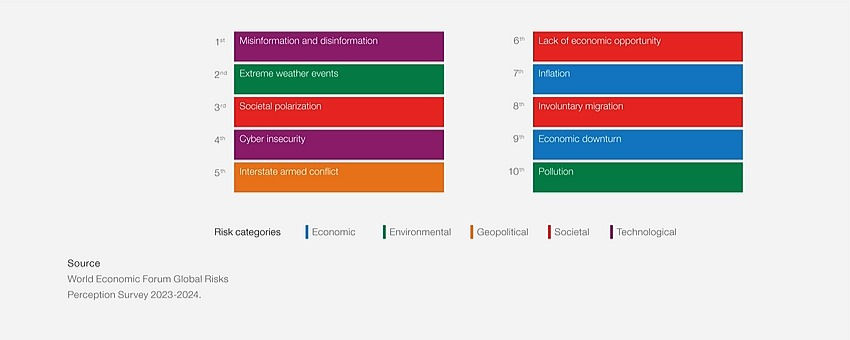The actions needed to address them will take a cultural shift and global cooperation.
The World Economic Forum recently published its Global Risks Report 2024, as they do every year in the lead-up to Davos. The Global Risks Perception Survey (GRPS) which informed the report includes the perceptions of 1,490 experts across academia, business, government, the international community, and civil society. The report also draws on the World Economic Forum’s Executive Opinion Survey (EOS) to identify risks that pose the most severe threat to each country over the next two years, as identified by over 11,000 business leaders in 113 economies.
The report does not have the most optimistic outlook. And with good reason.
As we enter 2024, 2023-2024 GRPS results highlight a predominantly negative outlook for the world over the next two years that is expected to worsen over the next decade. Notice that only 1 percent of those surveyed expect the world to be calm over both a 2-year and 10-year time frame. Over 60% of those surveyed expect a stormy or turbulent next 10 years (See figure A).

Environmental risks such as extreme weather events, critical change to earth's systems, biodiversity loss ecosystem collapse, and natural resource shortages, are the top four concerns over the long-term (10 years), while misinformation and disinformation top the list of short-term concerns (2 years) followed by extreme weather events, societal polarization and cyber insecurity. (See figure B).

There is a generational difference in risk perceptions. Younger respondents tend to rank environmental risks such as biodiversity loss, ecosystem collapse, and critical change to Earth systems far more highly over the two-year period compared to older age groups.
Each of these risks calls for action to address them, but how does that happen?
The report concludes that localized strategies, breakthrough endeavors, collective actions, and cross-border coordination will need to play a part in addressing these risks.
Addressing these risks will take investment from governments, companies, and investors alike. The longer-term risks, which tend to be environmental, will likely require the most investment, as these environmental issues speak to systems that need change to address each problem.
Reworking energy systems, transportation systems, agricultural systems, land use, and ocean use systems are all large cultural changes. This highlights the need for conversations about these changes to be had often, and by leadership across the economy and society. For the needed changes to take place, the urgency of these issues needs to be normalized. That means conversations at the kitchen table and the water cooler, not merely on the stages of Davos.
This will also help in one of the main steps needed, global coordination.
For these changes to take hold, leadership needs to come from the largest and most developed economies in the world, mainly the developed nations of the global North. It is in everyone’s long-term interest to address these issues. Technology and the ability to address these issues exist. However, addressing them will take resources and require big changes that have not been adequately presented to most people up to this point.
It is the political will to address these issues that are lacking. The incrementalism we see in the energy transition, and other parts of the global economy are headed in the right direction, but at a pace far too slow to mitigate those ten-year risks we see on the horizon.
It will take political, business, and investor leaderships to speak openly about these issues, so that everyone understands that we need to take a more aggressive approach to addressing our environmental problems.
This year is a very peculiar one politically, as about half of the planet’s people go to the election booth to pick their leaders. Will they get the leaders that they need?
